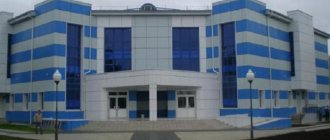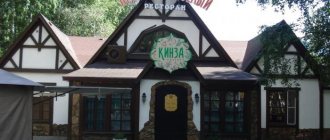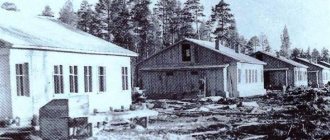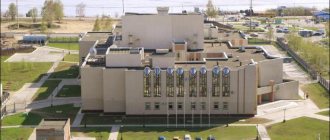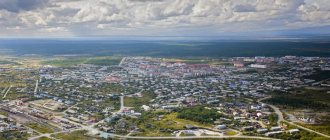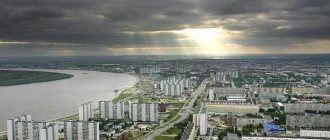Lyantor
(Khanty-Mansiysk Autonomous Okrug - Ugra)
OKATO code:
71126605
Founded:
1967
Urban-type settlement since:
1984
City since:
1992 City of district subordination (Surgut district of the Khanty-Mansiysk Autonomous Okrug)
The city was formerly called:
| Lyantorsky | 1992 |
| Telephone code (reference phone) | |
| 34638***** | 22-2-22 |
Deviation from Moscow time, hours:
2
Geographic latitude:
61°37′
Geographic longitude:
72°10′
Altitude above sea level, meters:
55 Sunrise and sunset times in the city of Lyantor
Attractions
- Khanty Ethnographic Museum.
- The stele installed at the entrance to the city is its calling card.
- The stela, installed in the city square, is dedicated to the historical past of the region, combining its ethnic history and the history of its oil development.
- A memorial plaque installed in front of the building of the NGDU Lyantorneft department in honor of its first boss, M. B. Nazargaleev.
- Pumping machine for an oil production well on the street. Consents.
- A stele installed on Victory Avenue, dedicated to the 70th anniversary of the victory in World War II.
Map
| Lyantor: maps |
Lyantor: photo from space (Google Maps) Lyantor: photo from space (Microsoft Virtual Earth)
| Lyantor. Nearest cities. Distances in km. on the map (in brackets along roads) + direction. Using the hyperlink in the distance , you can get the route (information courtesy of the AutoTransInfo website) | |||
| 1 | Nefteyugansk | 61 (103) | YU |
| 2 | Solar | 66 () | SE |
| 3 | Barsovo | 67 (115) | SE |
| 4 | Bely Yar | 69 (113) | SE |
| 5 | Poikovsky | 70 (166) | YU |
| 6 | Surgut | 76 (103) | SE |
| 7 | Fedorovsky | 81 (177) | IN |
| 8 | Nizhnesortymsky | 93 () | WITH |
| 9 | Pyt-Yakh | 102 (155) | YU |
| 10 | Kogalym | 141 (288) | NE |
| 11 | Langepas | 164 (224) | IN |
| 12 | Salym | 175 (260) | YU |
| 13 | Wiggle it | 180 (288) | IN |
| 14 | Khanty-Mansiysk | 181 (334) | Z |
a brief description of
Located on the river. Pim (tributary of the Ob), 95 km northwest of the railway. Surgut station, 625 km northeast of Tyumen.
Territory (sq. km): 63
Information about the city of Lyantor on the Russian Wikipedia site
Historical sketch
He grew up on the site of the fishing village of Pim in connection with the discovery of the Lyantorskoye (from the name of Lake Lyantor-Tukhlor near the Pim River) oil and gas field in 1966.
On February 5, 1984, the oil workers' rotation camp and the village of Pim were merged into the working village of Lyantorsky. City since 05/18/1992
Economy
Oil and gas industry enterprises, gas processing plant.
In the vicinity of Lyantor there are greenhouse farms of industrial enterprises. They raise pigs and poultry.
Lyantorskoye and Nizhnesortymskoye oil and gas fields.
Culture, science, education
Khanty Ethnographic Museum.
Museums, galleries, exhibition halls
Lyantor Khanty Ethnographic Museum 628449, Khanty-Mansiysk Autonomous Okrug - Ugra, Surgut district, Lyantor, st. Estonian Road Workers, 11 Phone(s): (34638) 20-440
| Population by year (thousands of inhabitants) | |||||||
| 1989 | 22.1 | 2005 | 35.4 | 2012 | 39.5 | 2018 | 40.3 |
| 1996 | 27.3 | 2006 | 36.2 | 2013 | 39.9 | 2019 | 40.9 |
| 1998 | 30.0 | 2007 | 37.4 | 2014 | 40.0 | 2020 | 41.2 |
| 2000 | 32.2 | 2008 | 38.1 | 2015 | 40.1 | 2021 | 41.6 |
| 2001 | 34.1 | 2010 | 40.2 | 2016 | 40.0 | ||
| 2003 | 33.0 | 2011 | 39.0 | 2017 | 39.8 | ||
Lyantor, city (Khanty-Mansiysk Autonomous Okrug - Ugra)
Lyantor is a city in the Khanty-Mansiysk Autonomous Okrug - Ugra.
Information from the website Lyantor.COM https://www.lyantor.com/
OKATO code: 71126605 Founded: 1967 Urban settlement since: 1980 City since: 1992 Deviation from Moscow time, hours: 2 Geographic latitude: 61°37′ Geographic longitude: 72°10′ Telephone code (reference phone) 34638**** * 22-2-22
A brief description of:
Located on the river. Pim (tributary of the Ob), 95 km northwest of the railway. Surgut station, 625 km northeast of Tyumen. Located in Khanty-Mansi Autonomous Okrug-Yugra. He grew up on the site of the fishing village of Pim in connection with the discovery of the Lyantorskoye (from the name of Lake Lyantor-Tukhlor near the Pim River) oil and gas field in 1966. Since 1980 it has been a workers' settlement. City since 1992. Population: 40 thousand.
City `s history:
The beginning of the history of the city of Lyantor is directly connected with the national village of Pim. The village of Pim was formed in the thirties, when the mass transfer of indigenous people from a nomadic to a settled way of life began. The village was named after the river on which it was located. The village of Pim consisted of barracks-type houses (about 20 houses), each housing six families. The population of the village, consisting mainly of Khanty peoples, was engaged in fishing. Fish were caught both in summer and winter. In the early forties, the Pimsky fish plot was organized, a fur farm was built, where fur-bearing animals were bred, and furs and berries were also accepted from the Khanty. Furs brought great income to the state. Hunting for arctic fox, fox, ermine, and otter was the traditional occupation of local peoples. But low procurement prices led to the fact that more and more representatives of indigenous nationalities were forced to abandon traditional fishing. The houses built for the Khanty near the fur farm remained empty. The population of the village was small and numbered up to 1,500 inhabitants. In the sixties, Pym was reborn. Construction materials are transported along the river, and construction of a boarding school and kindergarten begins. The population of the village is gradually increasing due to people coming from different places. There was no road from Surgut yet; mail was delivered by helicopter. The discovery of oil marked the beginning of great changes in the life of the village. Development of the Lyantorskoye field has begun. By 1972, a technical scheme was developed. On June 25, 1978, a decision was made to launch the Lyantorsky site - the exploitation of the field began. On January 1, 1980, the Lyantorneft oil and gas production department became a separate organization subordinate to the Surgutneftegaz production association. The construction of social and cultural facilities began: the first microdistrict, the first school, the first kindergarten. So, near the village of Pim, a small rotational camp grew up at first. In 1984, the village of Lyantorsky and the national village of Pim merged, and the settlement was classified as a workers' village. The number of residents of the village constantly increased, and in 1992 Lyantor was given city status. Now Lyantor is a young, growing city with a diversified industrial structure, the basis of which is oil production. In terms of oil production volumes and gas production volumes, the oil and gas production department "Lyantorneft" is the leading among all departments of "Surgutneftegaz" and has the largest operational well stock, the number of employees is also the largest.
Economy: Oil and gas industry enterprises, gas processing plant. In the vicinity of Lyantor there are greenhouse farms of industrial enterprises. They raise pigs and poultry. Lyantorskoye and Nizhnesortymskoye oil and gas fields.
Science, education, art, sports: The city has 6 schools, a boarding school for indigenous children, and two art schools. There are sports and recreational complexes "Olympus", "Yunost" and "Zvezdny". The Khanty Ethnographic Museum is open. The “Yubileiny” cultural center with bowling, a disco and many other entertainments is being prepared for delivery.
Information from the website Lyantor.COM https://www.lyantor.com/
Population
| Population | ||||||
| 1989 | 1996 | 1998 | 2001 | 2002 | 2003 | 2005 |
| 22 100 | ↗27 300 | ↗30 000 | ↗34 100 | ↘33 011 | ↘33 000 | ↗35 400 |
| 2007 | 2008 | 2009 | 2010 | 2012 | 2013 | 2014 |
| ↗37 400 | ↗38 100 | ↗38 959 | ↗38 992 | ↗39 455 | ↗39 866 | ↗40 000 |
| 2015 | 2016 | 2017 | 2018 | 2019 | ||
| ↗40 135 | ↘40 024 | ↘39 841 | ↗40 317 | ↗40 867 | ||
As of January 1, 2022, the city ranked 378th out of 1,115 cities in the Russian Federation in terms of population.
National composition
Below is data on the ethnic composition of the city according to the 2010 All-Russian Population Census
| Nationality | Number (persons) | Percentage |
| Russians | 20 026 | 51,36% |
| Tatars | 3 839 | 9,85% |
| Ukrainians | 3 148 | 8,07% |
| Bashkirs | 1 580 | 4,05% |
| Kumyks | 1 372 | 3,52% |
| Tajiks | 941 | 2,41% |
| Azerbaijanis | 778 | 2,00% |
| Chuvash | 675 | 1,73% |
| Chechens | 563 | 1,44% |
| Lezgins | 453 | 1,16% |
| Nogais | 431 | 1,11% |
| Uzbeks | 420 | 1,08% |
| Armenians | 326 | 0,84% |
| Kazakhs | 320 | 0,82% |
| Other | 2 560 | 6,56% |
| Not specified | 1 560 | 4,00% |
| Total | 38 992 | 100,00% |
mass media
Print mass-media
- Weekly "Lyantorskaya Gazeta"
- Advertising and information newspaper "Lyantorsky Weekly"
A television
- First channel
- Russia 1
- TV Center
- NTV
- Channel 5
- REN TV
- TNT/Teleradio
- STS
- Match TV
- Ugra
- TV-3
- Carousel
- Russia 24
- Russia K
Radio stations
- 101.5 FM – Radio Yugra
- 102.2 FM – Russian Radio
- 105.7 FM – Autoradio
Excerpt characterizing Lyantor
– Why didn’t you convince Bonaparte through diplomatic means that it was better for him to leave Genoa? – Prince Andrei said in the same tone. “I know,” Bilibin interrupted, “you think it’s very easy to take marshals while sitting on the sofa in front of the fireplace.” This is true, but still, why didn’t you take it? And do not be surprised that not only the Minister of War, but also the August Emperor and King Franz will not be very happy with your victory; and I, the unfortunate secretary of the Russian embassy, do not feel any need to give my Franz a thaler as a sign of joy and let him go with his Liebchen [sweetheart] to the Prater... True, there is no Prater here. He looked straight at Prince Andrei and suddenly pulled the collected skin off his forehead. “Now it’s my turn to ask you why, my dear,” said Bolkonsky. “I confess to you that I don’t understand, maybe there are diplomatic subtleties here that are beyond my weak mind, but I don’t understand: Mack is losing an entire army, Archduke Ferdinand and Archduke Charles do not show any signs of life and make mistakes after mistakes, finally, alone Kutuzov wins a real victory, destroys the charme [charm] of the French, and the Minister of War is not even interested in knowing the details. “That’s exactly why, my dear.” Voyez vous, mon cher: [You see, my dear:] hurray! for the Tsar, for Rus', for the faith! Tout ca est bel et bon, [all this is fine and good,] but what do we, I say, the Austrian court, care about your victories? Bring us your good news about the victory of Archduke Charles or Ferdinand - un archiduc vaut l'autre, [one Archduke is worth another,] as you know - even over a company of Bonaparte's fire brigade, that's another matter, we'll thunder into the cannons. Otherwise, as if on purpose, this can only tease us. Archduke Charles does nothing, Archduke Ferdinand is covered in shame. You abandon Vienna, you no longer defend it, comme si vous nous disiez: [as if you told us:] God is with us, and God is with you, with your capital. One general whom we all loved, Shmit: you bring him under the bullet and congratulate us on the victory!... Agree that it is impossible to think of anything more irritating than the news you bring. C'est comme un fait expres, comme un fait expres. [It’s as if on purpose, as if on purpose.] Besides, well, if you had definitely won a brilliant victory, even if Archduke Charles had won, what would it have changed in the general course of affairs? It is too late now that Vienna is occupied by French troops. - How busy are you? Is Vienna busy? “Not only is she busy, but Bonaparte is in Schönbrunn, and the count, our dear Count Vrbna, goes to him for orders.” Bolkonsky, after the fatigue and impressions of the journey, the reception, and especially after dinner, felt that he did not understand the full meaning of the words he heard. “Count Lichtenfels was here this morning,” Bilibin continued, “and showed me a letter in which the French parade in Vienna is described in detail. Le prince Murat et tout le tremblement... [Prince Murat and all that...] You see that your victory is not very joyful, and that you cannot be accepted as a savior... - Really, it doesn’t matter to me, it doesn’t matter at all! - said Prince Andrei, beginning to understand that his news about the battle of Krems really had little importance in view of such events as the occupation of the capital of Austria. - How was Vienna taken? What about the bridge and the famous tete de pont [bridge fortification] and Prince Auersperg? “We had rumors that Prince Auersperg was defending Vienna,” he said. “Prince Auersperg stands on this, our side, and protects us; I think it protects very poorly, but it still protects. And Vienna is on the other side. No, the bridge has not yet been taken and, I hope, will not be taken, because it is mined and they have ordered it to be blown up. Otherwise, we would have been in the mountains of Bohemia long ago, and you and your army would have spent a bad quarter of an hour between two fires. “But this still does not mean that the campaign is over,” said Prince Andrei. - And I think it’s over. And so the big caps here think, but they don’t dare say it. It will be what I said at the beginning of the campaign, that it is not your echauffouree de Durenstein, [the Durenstein skirmish] that gunpowder will decide the matter, but those who invented it,” said Bilibin, repeating one of his mots [words], loosening his skin on the forehead and pausing. – The only question is what the Berlin meeting of Emperor Alexander with the Prussian king will say. If Prussia enters into an alliance, on forcera la main a l'Autriche, [they will force Austria] and there will be war. If not, then the only question is to agree on where to draw up the initial articles of the new Campo Formio. [Campo Formio.] - But what extraordinary genius! - Prince Andrei suddenly cried out, squeezing his small hand and hitting the table with it. - And what happiness is this man! - Buonaparte? [Buonaparte?] - Bilibin said questioningly, wrinkling his forehead and thereby making it felt that now there would be an un mot [word]. - Bu onaparte? - he said, emphasizing especially the u. “I think, however, that now that he is enacting the laws of Austria from Schönbrunn, il faut lui faire grace de l'u. [we need to rid him of i.] I decisively make an innovation and call it Bonaparte tout court [simply Bonaparte]. “No, no joke,” said Prince Andrei, “do you really think that the campaign is over?” - That's what I think. Austria was left in the cold, and she was not used to it. And she will repay. And she remained a fool because, firstly, the provinces were ruined (on dit, le Orthodox est terrible pour le pillage), [they say that the Orthodox is terrible in terms of plunder,] the army was defeated, the capital was taken, and all this pour les beaux yeux du [for the sake of beautiful eyes,] Sardinian Majesty. And therefore - entre nous, mon cher [between us, my dear] - I instinctively hear that we are being deceived, I instinctively hear relations with France and projects for peace, a secret peace, separately concluded. – This can’t be! - said Prince Andrei, - that would be too disgusting. “Qui vivra verra, [We’ll wait and see,”] said Bilibin, unraveling his skin again as a sign of the end of the conversation. When Prince Andrei came to the room prepared for him and lay down in clean linen on down jackets and fragrant heated pillows, he felt that the battle about which he had brought news was far, far away from him. The Prussian Union, the betrayal of Austria, the new triumph of Bonaparte, the exit and parade, and the reception of Emperor Franz for the next day occupied him. He closed his eyes, but at the same moment the cannonade, gunfire, the sound of carriage wheels crackled in his ears, and then again the musketeers stretched out like a thread were descending from the mountain, and the French were shooting, and he felt his heart shudder, and he rode forward next to Shmit, and bullets whistle merrily around him, and he experiences that feeling of tenfold joy in life, which he has not experienced since childhood. He woke up... “Yes, it all happened!..” he said, smiling happily, childishly to himself, and fell asleep in a deep, young sleep. The next day he woke up late. Renewing the impressions of the past, he remembered first of all that today he had to introduce himself to Emperor Franz, he remembered the Minister of War, the courteous Austrian adjutant, Bilibin and the conversation of yesterday evening. Dressed in full dress uniform, which he had not worn for a long time, for the trip to the palace, he, fresh, lively and handsome, with his arm tied, entered Bilibin’s office. There were four gentlemen of the diplomatic corps in the office. Bolkonsky was familiar with Prince Ippolit Kuragin, who was the secretary of the embassy; Bilibin introduced him to others.
Geography
Located on the Pim River (a tributary of the Ob), 95 km northwest of Surgut, 825 km northeast of Tyumen.
Climate
The city of Lyantor is equated to the regions of the Far North.
The climate is sharply continental. Winter is cold and long - from the second half of October to mid-April. The average January temperature is −20-27°C. Temperatures can drop to -53°C. Stable snow cover from October to May. Spring is cooler than autumn, frosts (down to −3°C) are possible in the first week of June. Summer is warm, the average temperature in July is +15-25°C. Autumn from late August to mid-October. [ source not specified 1564 days
]
Notes
- ↑ 12
www.gks.ru/free_doc/doc_2016/bul_dr/mun_obr2016.rar Population of the Russian Federation by municipalities as of January 1, 2016 - ↑ 1234567
www.MojGorod.ru/hmao/ljantor/index.html People's encyclopedia “My City”. Lyantor - [www.perepis2002.ru/ct/doc/1_TOM_01_04.xls All-Russian Population Census 2002. Volume. 1, table 4. Population of Russia, federal districts, constituent entities of the Russian Federation, districts, urban settlements, rural settlements - regional centers and rural settlements with a population of 3 thousand or more]. [www.webcitation.org/65AdCU0q3 Archived from the original on February 3, 2012].
- [www.gks.ru/bgd/regl/b08_14t/IssWWW.exe/Stg/ur/05-00.htm Cities of the Khanty-Mansiysk Autonomous Okrug - Ugra (number of inhabitants - estimate as of January 1, 2008, thousand people) ]. Retrieved July 11, 2016. [www.webcitation.org/6ivWjf9ee Archived from the original on July 11, 2016].
- [www.gks.ru/bgd/regl/B09_109/IssWWW.exe/Stg/d01/tabl-21-09.xls Number of permanent population of the Russian Federation by cities, urban-type settlements and districts as of January 1, 2009]. Retrieved January 2, 2014. [www.webcitation.org/6MJmu0z1u Archived from the original on January 2, 2014].
- [tumstat.gks.ru/wps/wcm/connect/rosstat_ts/tumstat/resources/22904e804154168ab3dff7367ccd0f13/part+1.rar All-Russian population census 2010. Population size and its distribution in the Tyumen region]. Retrieved May 10, 2014. [www.webcitation.org/6PTJWMhJj Archived from the original on May 10, 2014].
- [www.gks.ru/free_doc/doc_2012/bul_dr/mun_obr2012.rar Population of the Russian Federation by municipalities. Table 35. Estimated resident population as of January 1, 2012]. Retrieved May 31, 2014. [www.webcitation.org/6PyOWbdMc Archived from the original on May 31, 2014].
- [www.gks.ru/free_doc/doc_2013/bul_dr/mun_obr2013.rar Population of the Russian Federation by municipalities as of January 1, 2013. - M.: Federal State Statistics Service Rosstat, 2013. - 528 p. (Table 33. Population of urban districts, municipal districts, urban and rural settlements, urban settlements, rural settlements)]. Retrieved November 16, 2013. [www.webcitation.org/6LAdCWSxH Archived from the original on November 16, 2013].
- [www.gks.ru/free_doc/doc_2014/bul_dr/mun_obr2014.rar Table 33. Population of the Russian Federation by municipalities as of January 1, 2014]. Retrieved August 2, 2014. [www.webcitation.org/6RWqP50QK Archived from the original on August 2, 2014].
- [www.gks.ru/free_doc/doc_2015/bul_dr/mun_obr2015.rar Population of the Russian Federation by municipalities as of January 1, 2015]. Retrieved August 6, 2015. [www.webcitation.org/6aaNzOlFO Archived from the original on August 6, 2015].
- taking into account the cities of Crimea
- [www.gks.ru/free_doc/doc_2016/bul_dr/mun_obr2016.rar Population of the Russian Federation by municipalities as of January 1, 2016. Table “31. Population of cities and towns by federal districts and constituent entities of the Russian Federation as of January 1, 2016.” RAR archive (1.0 MB)]
- [khmstat.gks.ru/wps/wcm/connect/rosstat_ts/khmstat/resources/a29180004f66ac249bbabf9b972d8349/4.pub-04-04_%D0%A2%D0%B5%D1%80%D1%80%3D71800+-3.pdf VPN volume 3. Table 4. Population by nationality and Russian language proficiency by urban districts and municipal areas of the Khanty-Mansiysk Autonomous Okrug - Ugra].
